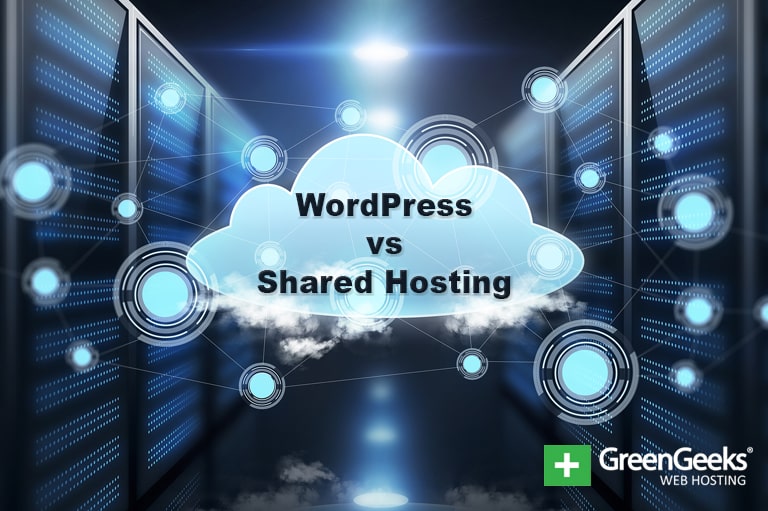One of the first things you need to consider when starting a new website is what type of hosting package is best for you. And if you are picking the world’s most popular CMS, WordPress, you have two options.
You can pick a shared hosting plan or a WordPress hosting plan.
Each plan has benefits and disadvantages depending on what you are planning to do and spend. Thus, which plan is the best for you is entirely subjective to your needs.
We will analyze each of these plans to help you decide which is the best choice for you.
You Need a Quality Web Hosting Company
It is important to realize that while most web companies have similar hosting packages, the companies themselves are not equal.
At GreenGeeks, we take pride in offering a fast, secure, reliable, and scalable environment for our customers to design their websites. We keep the prices low and only have a positive effect on the environment.
What Is Web Hosting?

Before you Begin analyzing each plan, it is important to actually understand what web hosting is. This is a service that allows you to rent space on a server for your website. When a visitor accesses your website online, they are connecting to this server.
Thus, if you do not host your website, it will not be online, which means no visitors can reach it.
Almost no two web hosting plans are the same and there are many factors to consider when looking at a plan. Not only do you need to consider what resources you will need, but the quality of the web host itself is just as important.
What Is Shared Hosting?
Shared hosting allows you to rent space on the same server as other websites. It fully supports multiple CMS, which means it is not designed specifically for one platform.
Shared hosting is very similar to having roommates. You all live in the same apartment and share the same space. This saves you money on rent. But if your roommate decides to have guests over, they are going to need more of that space.
Advantages and Disadvantages of Shared Hosting
The main advantage of this type of hosting plan is the low cost. This makes it the best option for a new website that will not need a lot of resources at the start, like a blog.
And since there are multiple customers on one server, downtime and technical issues are typically resolved much quicker than dedicated servers. On top of this, all maintenance is handled by the web host, which means you don’t need to have any knowledge of how servers function.
However, there are some important disadvantages that need to be looked at.
The main disadvantage is that you are sharing the resources of the server with other websites. Thus, if another website is getting unusually high traffic, you may have fewer resources for your website during that time.
A very large negative of a shared environment is the impact your neighbor’s actions can have on your website. If another website on your server decides to release malicious content that a search engine, Google, doesn’t like, they make sure that the website does not rank highly.
However, this also will affect your website’s SEO, even if you did nothing at all.
What is WordPress Hosting?

As the name implies, WordPress hosting is dedicated to hosting WordPress websites. This means the servers are specifically set up with WordPress in mind.
However, WordPress hosting is actually a much broader term. These specialized plans can include shared or dedicated hosting. On top of this, you may also see managed and unmanaged WordPress hosting.
Managed hosting means that the web host will help ensure that your website is running as smoothly as possible. This is done by helping you optimize the server’s performance.
As opposed to unmanaged hosting, which essentially means server optimization is entirely up to you. However, it is less expensive when compared to managed hosting.
Advantages and Disadvantages of WordPress Hosting
The main advantage is the performance increase you will notice. Websites will have better load times, better security, access to automatic WordPress updates, automatic backups, and support that is knowledgeable about WordPress.
And it goes without saying that WordPress comes preinstalled, which is great for those that are new to web development.
Many WordPress hosting plans are managed, which means the hosting provider takes care of the brunt of work when it is related to the server. This means as a web developer, you can spend more time designing content for your website and less time optimizing.
The main disadvantage of WordPress hosting generally includes the higher asking price. While you are certainly getting more for your money, many websites, especially new ones, do not need this level of service.
Since many hosting plans are managed, you end up with less control of your website. Managed WordPress hosting attempts a one size fits all approach, but that typically gives you fewer options to choose from. This is a big no-no for those who like to tweak their settings.
You Need a Game Plan

Now that you have a better understanding of shared vs WordPress hosting, you need to know what you need.
It is simply impossible to decide which hosting plan is right for you without understanding your own needs.
These are some of the basic questions you need to answer before even looking at a web hosting plan.
How much money are you willing to spend?
For most people, the price tag will be the deciding factor. The price of your hosting plan is the equivalent of renting space for a business, although much, much cheaper.
In many cases, if you are a newer website, you could easily go a year without making money off of a blog. Thus, picking the option that best suits your budget is essential.
Do you have a new or existing website?
If you have a new website, you should expect very little traffic. And as a result, you may not need a lot of resources to get started.
Whereas if you have an existing website, you should have clear statistics on your traffic by using tools like Google analytics.
The more traffic your website receives, the more resources you will need. So plan accordingly.
What type of content are you planning?
There are many types of websites, and each type produces different content. Different types of content use varied resources.
For example, some types of websites, like blogs, rely on text-based content. Others may rely more on images, like photo galleries, or videos.
File sizes are much larger for images and videos versus text, which means they use more resources.
Do you have the proper knowledge to manage your own server?
Having the experience and expertise to manage your website is becoming less common as more and more people attempt to make a website. If you are just starting out, you’re going to need all the help you can get.
A web host can significantly help you with this by offering additional management tools and quality support.
Do you want to limit yourself to WordPress?
While WordPress is the most popular CMS available, and my personal favorite, there are still plenty of others to choose from. If you want to try out other CMS, picking a WordPress hosting plan is a big mistake as the plan is geared towards that platform.
Which Plan Should You Choose

I am going to go through a few scenarios to make it clear which is the best for you. Remember WordPress hosting is a very broad term, and I will try to cover multiple plans.
Shared Hosting
If you are brand new to web development and are just testing the waters, shared hosting is the best plan to pick. It will be a very small cost every month to maintain and your web host will handle most of the settings.
It is also a great pick if you do not expect a lot of traffic because then you will not need a lot of resources. Some great examples of websites that may fall into this category are online portfolios and business pages with contact info on them.
Shared WordPress Hosting
A Shared WordPress plan is quite similar to a normal shared plan and will fit the same type of websites, but the main difference is the performance increase and the extra amount of money you will pay for it.
This is ideal if you have a new website but need to ensure it runs smoothly. I would recommend this method for new online stores since, if a customer thinks the website is slow or unresponsive, he or she is less likely to make a purchase.
Dedicated WordPress Hosting
If you have an existing website that is expecting a fair amount of traffic, dedicated WordPress hosting is probably the better option. Your website will have plenty of resources to handle the demand while also having plenty of room to expand.
However, dedicated hosting of any kind is more expensive as a service. Thus, you need to make sure you are actually going to be able to afford the cost of your own server. But if you get a lot of traffic, that shouldn’t be an issue.
Unmanaged WordPress Hosting
If you are an experienced web developer who understands how to properly optimize your website and love to tweak your own settings, this is the plan you want. Other plans take away many of the options you may be fond of.
It can also save you a few bucks to do the work yourself versus having a hosting company do it.
Managed WordPress Hosting
If you do not have time or the knowledge to manage everything yourself, having your hosting company help out and provide additional management tools can be a lifesaver.
Of course, you are going to be paying for those extra services. So, it really does come down to your budget and availability.
Websites Are Unique, So Plans Need To Be Too
No two websites are the same and I don’t just mean their design. The traffic they receive, the content created, the hours in which they are accessed the most are all dependent on a myriad of factors.
Every website is a unique case.
For this reason, your web hosting plan needs to be unique, too. This is why there are so many hosting plans to choose from. The plan you choose should provide you the proper amount of resources.
Taking a bigger plan with more resources than you can use is a great way to waste money. Thus, you need to pick a plan that has the resources you need while leaving room to grow.
However, if you make a mistake picking a service, remember that it’s easy to switch or upgrade plans. Also, if you are unsatisfied with your web host, you can always transfer to a more reliable one at any time.



Hi Robert,
Very nice post and informative. Well described about Shared hosting vs WordPress hosting. It’s a very helpful article for beginners specially who are confused about shared and wordpress hosting. Great Job, Keep it up.
Thanks! I’m glad I can help.